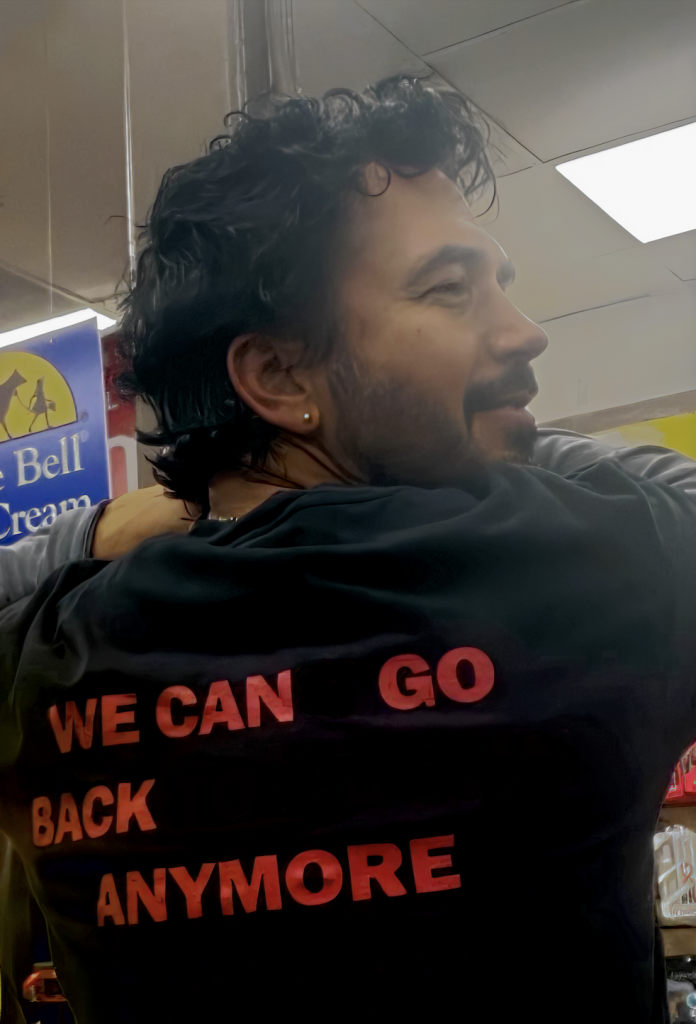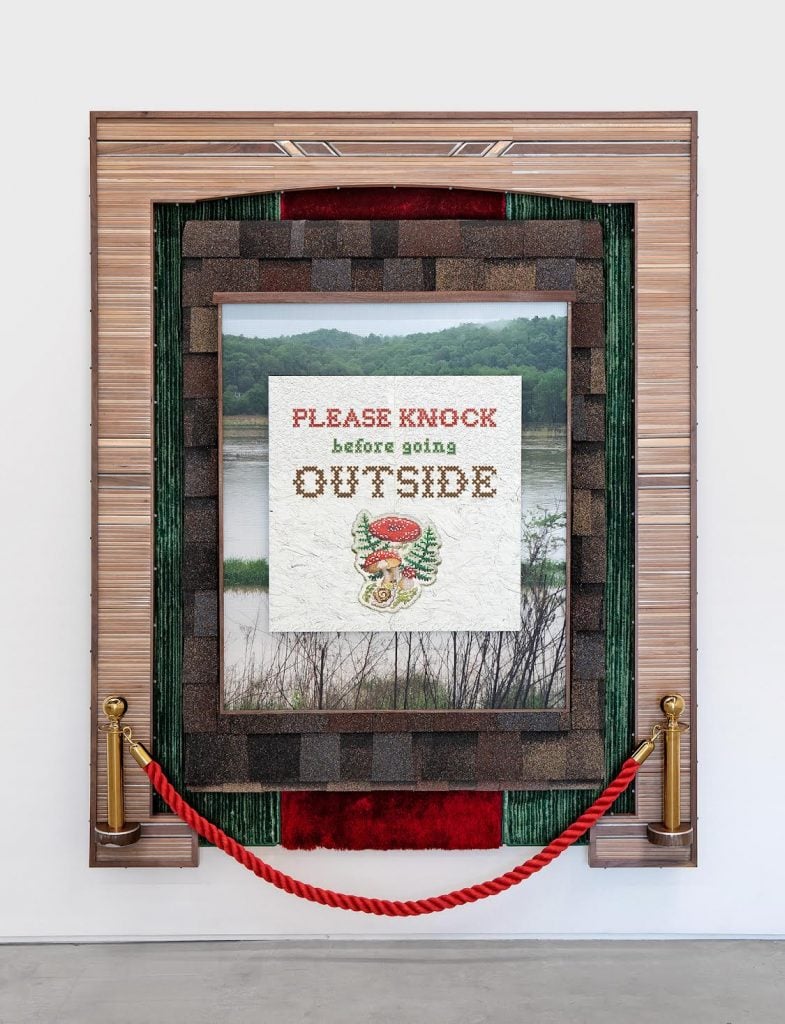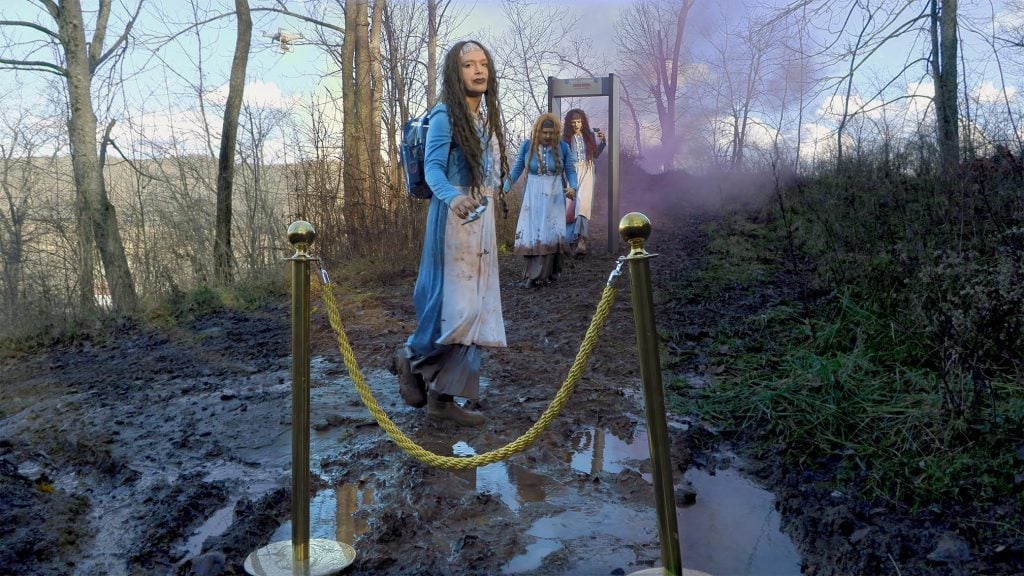Art World
Artist Ryan Trecartin Built His Career on the Internet. Now, He’s Decided It’s Pretty Boring
His last film premiered in 2019. Next year, he'll show new work for the first time in over five years at Moràn Moràn.

His last film premiered in 2019. Next year, he'll show new work for the first time in over five years at Moràn Moràn.

Annie Armstrong

It’s a good time for Ryan Trecartin to make a comeback. The last time we heard from him, he had been making a splash as the young experimental artist taking internet culture by the horns through his boisterous and visionary films. Since his most recent missive Whether Line came out in 2019, Trecartin had been quiet, living in rural Ohio with his creative partner Lizzie Fitch. Now, there are rumblings of a return for Trecartin, as he recently switched up his gallery representation from Regen Projects to Morán Morán. We can anticipate a solo show at the gallery early next year. While he’s working on it, Artnet caught up with the artist to see where his head’s been.
Hey Ryan! What are you up to right now?
Hello! Well, I’m working on these text pieces that I started making. They’re like—I guess, they’re photos? Well, they’re not really photos. In Whether Line, I have these props that were cross-stiches that were on the walls. We found this printing process that can do micro-reliefs, so it can print dimensionally. So I’m re-making these into these reliefs and then my brother, who does carpentry, he’s building the frames with me that are these big housings for them. So I’m just working on some of the files.
So you’re still living with your collaborator Lizzie Fitch in Ohio? Just personally, I know you’ve been there for a long while now, but what made you two choose exactly where you are in Ohio?
Basically back in 2014, a group [of friends] visited my brother in Athens, Ohio. He lives here. And we were walking on his land and we ended up on this other property. We were trespassing, but we didn’t realize it. And when my brother said that we were on somebody else’s property, we were like, “Oh, that place is amazing. If it ever goes up for sale, let us know.”
Then it was up for sale right before the election. We didn’t move there until 2017 because we had to wrap some stuff up. We had never owned anything. And we’ve always thought about how these sets we make, they get ruined in the end. And we’ve always wanted to make an amusement park, or basically just have something that we grow over many decades that becomes like a sculpture that is made collaboratively with all the artists we work with.

Ryan Trecartin. Photo: Borna Sammak.
Wow, cool. So the plan is that one day this is something that people can make a pilgrimage to?
Yeah. We kinda also wanted get some funding for it in the future, so we can commission permanent things for it by our collaborators. Many of them are artists who act in my movies. Then, we can hand it over at some point to the public as a park that can be visited. We were talking with the Prada Foundation. I mean, Prada was really cool about it—which was a really amazing experience because we proposed all these crazy sets. And [Miuccia] was down for it, which is wild.
How’s it coming along?
So we have this building that was the main set for Whether Line, which is now a studio and post-production space. We also have a lazy river that’s almost done and a watchtower.
What else have you been up to? It’s been a while since the art world has heard from you. Am I right to think your last film was Whether Line?
It’s confusing cause what people know Whether Line was made very specifically for the show at the Prada Foundation. So, that edit was an installation edit. And I don’t really consider something a movie until it’s online or showing in a theater setting. We were going to edit Whether Line to travel, but then the pandemic happened and shows got canceled and I took the opportunity to take a break.
Then, when we started coming out of the pandemic, I was working on Telfar stuff, and having a lot of fun working on my friends’ projects in a way that I haven’t totally been able to do in such a deep way because I had been so busy. I’m just now going back to that movie and I’m going to re-edit it. It’s going to come out at a show with Sprüth Magers and then it’s gonna show at Morán Morán.
It must be an interesting part of your practice to deal with the internet so closely, and the internet’s effects on society. The impact of internet culture changes so quickly.
Yeah, I always try to look at it from the side of my eye, or sideways. I don’t intentionally directly reference a moment in time, or anything like that. It’s more about focusing on behavior and communication. And then things emerge that are mutated.

Ryan Trecartin
Please Knock Before Going Outside (Flood Season), 2023
Micro-relief prints, area rugs,architectural roofing shingles, stanchions, rope, roofing screws, metallic finishing paint, black walnut, cherry wood, white elm, and plywood. Additional credits: Adam Trecartin: Wood milling, carpentry, and print housing construction; Murphy Maxwell: Whether Line prop and font consultant
91 x 72 x 10 1/2 inches
(231.1 x 182.9 x 26.7 cm)
Courtesy of Sprüth Magers and Morán Morán
I feel like your videos really predicted this ADHD TikTok brain that everybody either has or is afraid of.
I think Jeremy O. Harris tweeted once that TikTok started with I-Be-Area and that made me really happy.
I know that you’ve made your work democratically viewable on Vimeo. What did you make of the metaverse and all of that conversation? NFTs, etc.?
I, of course, loved the idea of artists who have always been working in a digital space and who have never been able to survive off of it to suddenly find that they could make some money. I thought that was great. [Laughs.] But I felt like the conversations around it were so gross, you know? But then at the same time, conversations around art are also gross on that end of it, it’s just more behind closed doors.
I just felt like I wasn’t going to do it just because people assumed I’d want to do it, you know? The idea has to fit with the home, and I didn’t have an idea that needed to be an NFT for it to exist.
How do you, right now in this instant, feel about online culture and how it’s affecting people? Are there any new observations since you created Whether Line?
The way everything is so algorithmic is no longer funny; it’s just depressing—these little trappings and prisons that are being generated that we reinforce just because they work. It’s just boring! It’s not interesting. I was never really pro or anti. But now it’s like, “Well, where’s the invention and where’s the experiment and the play at?” It’s just capitalism now. Which I guess it always was, but there was this moment where it felt like it could potentially not be.
Everyone thinks that my first movies were about the internet, but they weren’t. I think because of the times I was living in, the internet made people understand what I was trying to say. The thing is we always invent things inside the limits of our imagination. We’ll call it a “page” instead of making a new word for it because we’ve invented it based on things we know. So I feel like the internet already is us and was always us.

Film still of Ryan Trecartin, Whether Line (2019), commissioned by Fondazione Prada. Courtesy of Sprüth Magers and Morán Morán. © Ryan Trecartin
As in, the internet is just a continuation of the creativity and media that we’ve always produced?
Yeah! And I’m really inspired by the root of what it constructs. How do we mutate and evolve this system that we apparently invented and that we’re a chunk of. And I’m interested in dynamics and communication and behavior and emotions.
I try to make my movies feel like music. You know how the first time you hear a song, you hear the whole form, and it’s more of a ride and an experience than when you obsessively play it on repeat and you start to hear all the components that make the song. [My movies] are designed to be more of a ride that you have to let wash over you and dive into.
A scary part of art is that as you get older you’re like, “Whoa. This reads differently now.” Because culture’s in a different space. But I also think that’s really exciting. I want them to morph and change.
More Trending Stories:
Art Dealers Christina and Emmanuel Di Donna on Their Special Holiday Rituals
Stefanie Heinze Paints Richly Ambiguous Worlds. Collectors Are Obsessed
Inspector Schachter Uncovers Allegations Regarding the Latest Art World Scandal—And It’s a Doozy
Archaeologists Call Foul on the Purported Discovery of a 27,000-Year-Old Pyramid
The Sprawling Legal Dispute Between Yves Bouvier and Dmitry Rybolovlev Is Finally Over